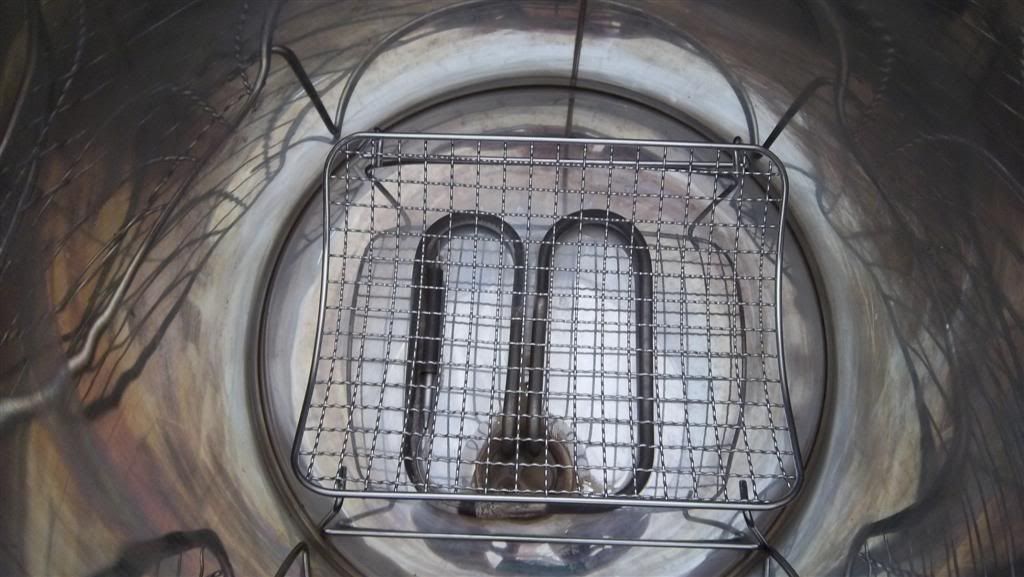Sim's BIAB method
-
simco999
Sim's BIAB method
I did this for a mate as he wanted to try BIAB.
Other BIAB methods are available. Sorry for the formatting - the forum won't let me change it.
Day before: Clean boiler (60 litres) . Fill with enough water to cover the elements. When water is boiled flush the tap out. Just to make sure there is no crap in the tap. Chuck rest of boiled water.
Clean the hop stopper. Attach hop stopper to tap. Make sure the tap is closed.
Fill boiler with 34 litres of tap water. Crush one campden tablet into it. Give it a stir with a clean spoon.
Leave overnight with lid on and cover hole in lid. This is to allow the chlorine to be removed from the water.
Brewday: Start to heat the water. I usually heat it to 74C.
Make sure your grain is weighed out before hand.
Boil a kettle!!
When the water hits 74C (strike temp) switch off the elements and then put the bag (voile) in. Don't have the bag in when the elements are on!!!
Carefully tip some grain in until the bag is fully in the water. Use the bungee cords to secure the bag.
Slowly add your grain and make sure you stir well when adding it.
When all the grain is in take the temp. Add boiling water to make up the temp if necessary. It needs to be between 62 and 68C. But bear in mind the temp will fall over the mash time. I usually lose about 3 or 4 degrees over 90 mins.
Put the lid on and wrap the boiler in an old quilt or blankets. I mash like this for 45 mins then check the temp again (add boiled water out of the kettle if needs be) and give it a good stir. Then mash for another 45 mins.
Total mash time 90 mins.
Mash out: After the mash lift the bag out and put into an FV or a bucket. (Edit - I now sparge with boiling water in the FV - 2-3 kettles full. If you use this method reduce the original water volume by the amount you sparge - e.g 4.5 litres for 3 kettles worth ) Switch the boiler back on and heat to 80C. Switch off and put the bag back in. Give the grain a good stir.
Leave for 30 mins.
Lift the bag out and let it drain. I put it into a bucket with a metal grill to allow it to drain. After a while ditch the grain and put the wort back into the boiler.
Boil: Boiler on until it starts to boil - mind the steam its deadly - I switch off one element to achieve a rolling boil - add your 60 mins hops (pre-weighed out). I put the lid on partially - this stops big losses but allows the crap to get out.
Add your other hops at the recipe defined intervals - usually 15 mins from end.
15 mins from end also put the chiller in to sterilise and add any additions - e.g. Irish moss etc. (Edit - After a big heads up from PDTNC I add about 40g of hops after the boil - what a difference to the flavour!!) Whirlpool the wort to get the hops away from the hop stopper. Really helps with getting the wort into the FV without blocking the tap)
Total boil time 60 mins.
Cool: Move the boiler to the sink and start the chilling process. Attach the chiller and make sure there are no leaks. I would test it the night before.
Let it chill until it hits 22C ish. Transfer to FV and pitch yeast.
Note: I don't use the chiller anymore. I empty the boiler into an FV and leave to cool overnight. No probs so far.
Other BIAB methods are available. Sorry for the formatting - the forum won't let me change it.
Day before: Clean boiler (60 litres) . Fill with enough water to cover the elements. When water is boiled flush the tap out. Just to make sure there is no crap in the tap. Chuck rest of boiled water.
Clean the hop stopper. Attach hop stopper to tap. Make sure the tap is closed.
Fill boiler with 34 litres of tap water. Crush one campden tablet into it. Give it a stir with a clean spoon.
Leave overnight with lid on and cover hole in lid. This is to allow the chlorine to be removed from the water.
Brewday: Start to heat the water. I usually heat it to 74C.
Make sure your grain is weighed out before hand.
Boil a kettle!!
When the water hits 74C (strike temp) switch off the elements and then put the bag (voile) in. Don't have the bag in when the elements are on!!!
Carefully tip some grain in until the bag is fully in the water. Use the bungee cords to secure the bag.
Slowly add your grain and make sure you stir well when adding it.
When all the grain is in take the temp. Add boiling water to make up the temp if necessary. It needs to be between 62 and 68C. But bear in mind the temp will fall over the mash time. I usually lose about 3 or 4 degrees over 90 mins.
Put the lid on and wrap the boiler in an old quilt or blankets. I mash like this for 45 mins then check the temp again (add boiled water out of the kettle if needs be) and give it a good stir. Then mash for another 45 mins.
Total mash time 90 mins.
Mash out: After the mash lift the bag out and put into an FV or a bucket. (Edit - I now sparge with boiling water in the FV - 2-3 kettles full. If you use this method reduce the original water volume by the amount you sparge - e.g 4.5 litres for 3 kettles worth ) Switch the boiler back on and heat to 80C. Switch off and put the bag back in. Give the grain a good stir.
Leave for 30 mins.
Lift the bag out and let it drain. I put it into a bucket with a metal grill to allow it to drain. After a while ditch the grain and put the wort back into the boiler.
Boil: Boiler on until it starts to boil - mind the steam its deadly - I switch off one element to achieve a rolling boil - add your 60 mins hops (pre-weighed out). I put the lid on partially - this stops big losses but allows the crap to get out.
Add your other hops at the recipe defined intervals - usually 15 mins from end.
15 mins from end also put the chiller in to sterilise and add any additions - e.g. Irish moss etc. (Edit - After a big heads up from PDTNC I add about 40g of hops after the boil - what a difference to the flavour!!) Whirlpool the wort to get the hops away from the hop stopper. Really helps with getting the wort into the FV without blocking the tap)
Total boil time 60 mins.
Cool: Move the boiler to the sink and start the chilling process. Attach the chiller and make sure there are no leaks. I would test it the night before.
Let it chill until it hits 22C ish. Transfer to FV and pitch yeast.
Note: I don't use the chiller anymore. I empty the boiler into an FV and leave to cool overnight. No probs so far.
Last edited by simco999 on Sat Dec 17, 2011 6:10 pm, edited 4 times in total.
Re: Sim's BIAB method
Sounds good Sim. Do you have any pics to show us too?
Just a question, why do you mash out for 30mins? I would have thought that 5 mins would be enough but maybe I am wrong. What kind of efficiency do you get?
Just a question, why do you mash out for 30mins? I would have thought that 5 mins would be enough but maybe I am wrong. What kind of efficiency do you get?
-
simco999
Re: Sim's BIAB method
The idea of a mash out is to get the max amount of sugar out of the grain. Maybe 15 mins would be ok. Can get some pics if needed.
It works for me.
It works for me.
-
Bribie
Re: Sim's BIAB method
I used to do stepped mashes and mashouts using exactly the same method, but it involves a lot of hoisting the bag then re-dunking, as you've found.
Of course the problem is that you don't want the bag touching the element (or bottom of the pot if it's a gas system) or it can stick and melt.
I've found a perfect method of applying heat mid-mash without removing the bag:
"curved roasting rack" from a kitchen shop, it keeps the bag well off the element, and I stir it - or rather pump it up and down - with a paint stirring tool that looks like a giant potato masher, available from paint shops. Hint: tie some twine round the rack so you can fish it out at end of mash
Only takes a few minutes to get it from mash to mashout, even quicker if you do a 72° step for half an hour to ensure complete conversion.


Of course the problem is that you don't want the bag touching the element (or bottom of the pot if it's a gas system) or it can stick and melt.
I've found a perfect method of applying heat mid-mash without removing the bag:
"curved roasting rack" from a kitchen shop, it keeps the bag well off the element, and I stir it - or rather pump it up and down - with a paint stirring tool that looks like a giant potato masher, available from paint shops. Hint: tie some twine round the rack so you can fish it out at end of mash
Only takes a few minutes to get it from mash to mashout, even quicker if you do a 72° step for half an hour to ensure complete conversion.


-
RdeV
Re: Sim's BIAB method
Bribie, I've seen that image a few times now and the reflections still space me out! 
-
simco999
Re: Sim's BIAB method
Good tip thanks - it looks a bit too big for my boiler I'll have a look for ones to fit mine
Last edited by simco999 on Tue Dec 13, 2011 2:34 pm, edited 1 time in total.
Re: Sim's BIAB method
Thanks Sim for posting this, I used it as a rough guide for doing my first BIAB on Sunday. Graham Wheelers Batemans Dark Mild clone.
It all went smoothly and the fermenter is bubbling away nicely, looking forward to when the beer is in decent condition
It all went smoothly and the fermenter is bubbling away nicely, looking forward to when the beer is in decent condition
Maidstone Brewers Homebrew Meets - Last Tuesday of the Month - 1930 Thirsty Pig Maidstone
https://Twitter.com/maidstonebrews https://www.facebook.com/groups/maidstonebrewers
https://Twitter.com/maidstonebrews https://www.facebook.com/groups/maidstonebrewers
-
simco999
Re: Sim's BIAB method
Let me know how it works out. It really is a case of trying different steps to find what works best for you. I've got 20 odd brews under my belt and still learning loads on here. Only one went disastrously wrong!! My stupid fault!!legion wrote:Thanks Sim for posting this, I used it as a rough guide for doing my first BIAB on Sunday. Graham Wheelers Batemans Dark Mild clone.
It all went smoothly and the fermenter is bubbling away nicely, looking forward to when the beer is in decent condition

